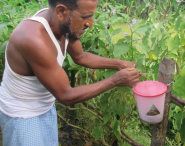Use of pesticides in Bangladesh increased by six times from 1954 until 2010. A vegetable farmer uses pesticides around 150 times in one session. There are 377 pesticides that are still used in the country despite being banned in developed countries.
Umar Faruhk of Char fasson Upazila in Bhola district is a village doctor by profession. He engaged in small-scale farming producing brinjal (eggplant) with the use of chemical insecticides. He gave up brinjal cultivation when he discovered the harmful effects of chemical insecticides on his family. After two years, he resumed farming, upon the motivation of COAST. Farukh discovered that the alternative technology is much more economical than to chemical pesticides. He spent only 1,680 taka (around US$21.00) for his 40 decimal land (0.16 hectares) instead of 15,000 taka (around US$188). He made a proft of 65,000 taka (around US$817) last season. He is now providing training to other farmers on brinjal cultivation using sex pheromones.
MTCP2 farmers’ organizations in partnership with COAST Trust held a press conference to educate the public on the harmful effects of excessive use of pesticides. Local media provided huge support, which caught the interest of the local agriculture department who eventually invited farmers to share their experience on alternative pesticides. MTCP2 supported the awareness-raising campaign, provided technical support to educate farmers on alternative farming systems through training, mobilization, community radio, leaflet distribution and liaising with government. At present, local people are using sex pheromones as an alternative to chemical pesticides.
Like Farukh, farmers care about their family and the community and would opt to use safe farming methods when alternatives are presented to them.

Comments are closed